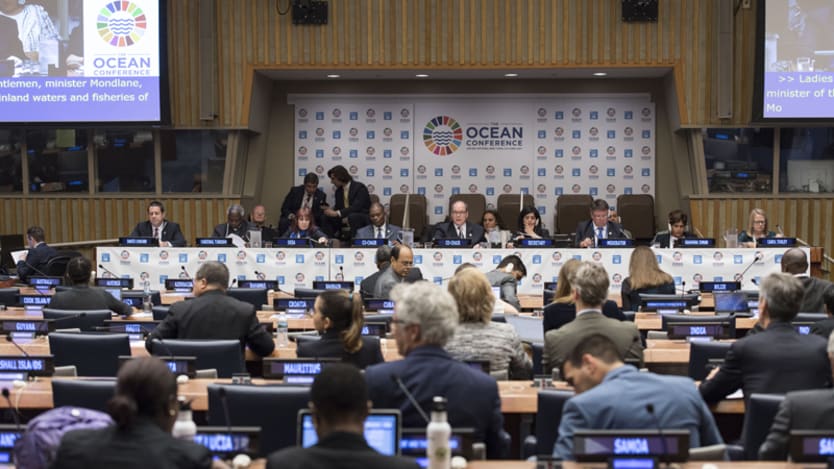
The United Nations Ocean Conference drew to a close with a joint “call to action” issued by member states after a week of back-to-back events on the world’s oceans’ faltering health.
See more Devex coverage of the U.N Ocean Conference:
► Fish, finance and Trump: What to expect at the UN Ocean Conference
► Q&A: Commonwealth secretary-general talks Ocean Conference takeaways
► Research, solutions needed for looming oceans catastrophes, UN leaders say
► Q&A: UN's Dessima Williams on the blue economy and why it matters
The document itself affirmed continued support to the implementation of Sustainable Development Goal 14, including strategies to reduce use of plastics and strengthen adaptation and mitigation measures to counter sea-level rise, but it lacks legal teeth.
Yet the conference’s impact is likely to be felt for years to come, experts at international environmental NGOs say, as oceans could be the next major focus area in international development.
“This is the first conference, ever, of this kind on the ocean organized by the U.N. to discuss this, so that is a big milestone for the future,” said Marta Marrero, the director of ocean governance at the Nature Conservancy. “It is setting the scene for the next steps. Concretely, we have the ‘call to action.’ But, it is a good sign, and a good stepping stone.”
One of those next big steps might fall within the oceans’ (legally) darkest parts.
Up to 70 percent of all of the Earth’s oceans — or, more than 50 percent of the planet — is unregulated by any one country. The U.N. General Assembly adopted a resolution two years ago to establish the first international treaty for the conservation of marine life and governance of the “high seas,” as they are known.
“It’s the last place on earth that is not governed in one way or another, and it is tempting for the U.N., or for some governments, to look for practical solutions coming out of this,” said Lasse Gustavsson, a senior vice president of Oceana, the international advocacy and research group. “I have a feeling ocean conservation is possibly going to be the next big thing in the international system.”
Governments will reconvene at the U.N. in mid-July to discuss the possible text for such a treaty, which could cover everything from establishing marine protected areas to distributing the benefits of “marine genetic resources,” or products that are generated from the seas and could have a high commercial value. Developing countries have much to gain, but also lose, from such a treaty, which governments will likely formally negotiate on in 2018, says Marrero.
Opinion: Global shadow financial system enables the plunder of the world's oceans and seas
Ahead of the United Nations Ocean Conference, U.N. Development Program Policy Specialist Gail Hurley explores how international finance institutions can support Sustainable Development Goal 14 on ocean conservation.
“Developing countries would be able to benefit if, and only if, the legal text establishes some rules of the game that allows that to happen,” she said. “Otherwise, the developed nations would exploit the resources and developing countries that are closer to [the high seas] would never see the benefits of it. It needs to be a mechanism to exchange technology, exchange science and exchange examples.”
For many people in the world’s developing countries, especially small island developing states, their connection to the oceans and livelihoods are deeply intertwined. Marine fisheries support, directly or indirectly, more than 200 million people.
Yet as Gustavvson points out, fishing is mostly conducted in shallow waters, controlled by individual governments. That means an international treaty brokered at the U.N. would likely not help solve the problem of overfishing, a worsening problem that has lasting impacts on both fish populations and people dependent on them.
Essam Yassin Mohammed, a senior researcher and economist at the International Institute for Environment and Development was on hand at the summit to discuss how developing countries can sustainably fish. Mohammed and IIED consult with the government of Bangladesh, and have worked to coordinate Bangladeshi ministries to link and address some of the various problems, such as pollution and pesticide runoff from land and rivers, and climate change, which are all damaging marine ecosystems. They’ve also been invited to work with Costa Rica.
“You need an interconnected system, and to coordinate to address these problems,” he said.
As the summit unfolded, and governments, private sector, foundations, academic institutions and civil society groups pledged 1328 voluntary commitments for improving the oceans and marine life, some gaps in ocean science were made clear. One particularly notable commitment is the Tuna 2020 Traceability Declaration, which pledges to make tuna fully traceable to vessel and ship dates. Some of the biggest companies in the fishing business have signed the agreement.
Portugal also announced this week it would host another ocean conference in 2020. The “Our Ocean” conferences have also gained attention — the next one will take place in Malta this October.
More funding and support for ocean science is critically needed, UNESCO found in a new report.
“It’s the biggest gathering to talk about the oceans and the commitments, enthusiasm is astounding. The problems that oceans face is enormous. We need the enthusiasm to move ahead,” Lisa Speer, the director of international oceans program at Natural Resources Defense Council said during a media briefing. “We know more about the backside of the moon than we do about our own oceans.”
Read more international development news online, and subscribe to The Development Newswire to receive the latest from the world’s leading donors and decision-makers — emailed to you free every business day.






